Army Survivor Outreach Services
Army Survivor Outreach Services helps survivors navigate the death of a family member and the emotional and logistical support available.
Army Survivor Outreach Services helps survivors navigate the death of a family member and the emotional and logistical support available.
More than 3,000 children lost a parent on that awful day. Fifteen years later, in a world rocked by terror, this group has hard-won wisdom to share. Here, in their own words, is a glimpse into their journeys.
By Wayne Drash and Moni Basu, CNN
Updated 10:39 AM ET, Wed July 27, 2016
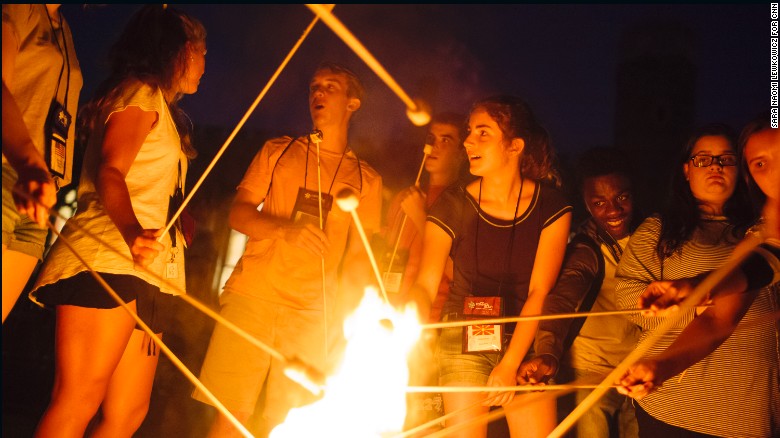
Campers at Project Common Bond roast marshmallows over a fire.
Philadelphia (CNN)They are teenagers and young adults. Yet in their short lives they each have been touched by terror.
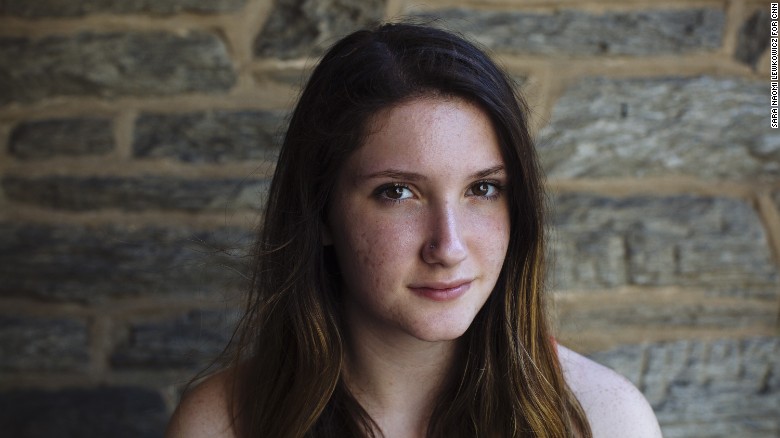
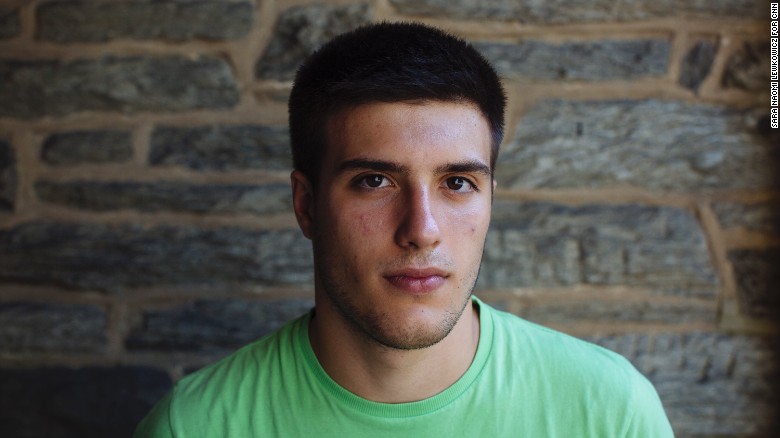
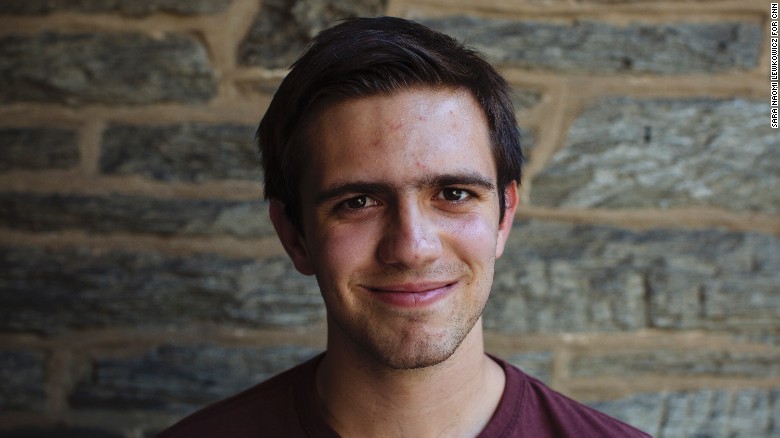
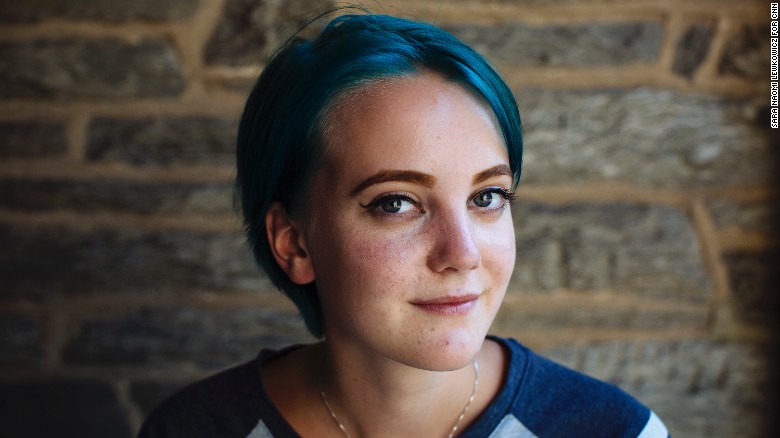
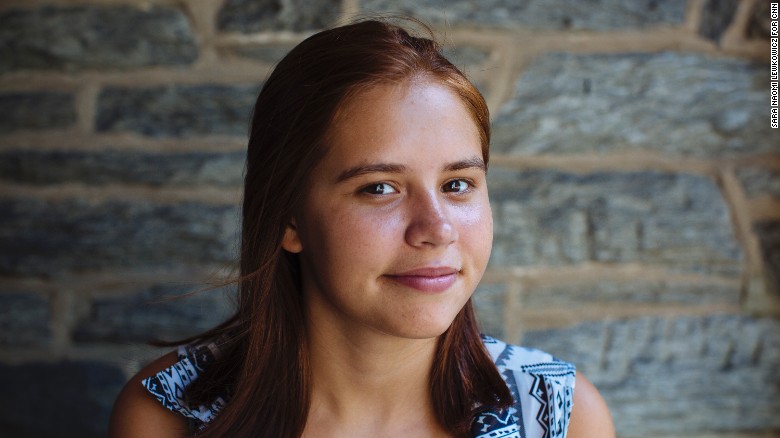
by Samantha Manning, ORANGE PARK, Fla. —
Using paint therapy, cooking classes and intimate conversations, members of Project Heart to Heart are able to help each other cope with unspeakable loss.
The program is run by the nonprofit organization Tuesday’s Children, which provides support for military widows and widows of Sept. 11 victims.
Orange Park resident Shannon Thorp recently joined the group.
Thorp’s husband, Army Spc. Trent Thorp, was a father of two and had served in Afghanistan before returning to the U.S. where he was stationed in Washington state.
Thorp was killed in a shooting with police in 2011.
“He was an exceptional soldier,” Thorp said. “A great father. Great husband.”
Thorp said Tuesday’s Children has given her new hope to keep moving forward.
“It’s a very small group of people that we know don’t cast any judgment,” Thorp said. “They relate unconsciously.”
Thorp said the greatest benefit for her has been learning from women who have been coping with their grief for a much longer period of time – women like Andrea Garbarini.
“We have supported each other through the years and I really don’t know how I would have done it without them,” Garbarini said.
Garbarini’s husband, New York Fire Department Lt. Charles Garbarini, was a first responder with Engine 23 in Manhattan on Sept. 11.
Garbarini didn’t survive.
“They ran towards what everybody was running away from,” Garbarini said.
“You can see hope,” Thorp said. “You’re going to turn out OK and their kids are great. The kids are wonderful.”
Tuesday’s Children also provides Project Common Bond, which gives support to children who have lost parents.
“My son Phillip has participated for the last three years, and what it does is it brings together children from all around the world that are victims of terrorism,” Garbarini said.
Project Common Bond was initiated by children of Sept. 11 victims.
“They came to us and said we want to talk to others in the world who have been impacted by the same thing as us,” Director of Programs for Tuesday’s Children Diana DeClemente said.
When tragedy strikes, as parents you find yourself doubly challenged: to process your own feelings of grief and distress, and to help your children do the same.
I wish I could tell you how to spare your children pain, when they’ve lost friends or family members, and fear, when disturbing events occur, especially when they’re close to home. I can’t do that, but what I can do is share what I’ve learned about how to help children process disturbing events in the healthiest way.
As a parent, you can’t protect you children from grief, but you can help them express their feelings, comfort them, and help them feel safer. By allowing and encouraging them to express their feelings, you can help them build healthy coping skills that will serve them well in the future, and confidence that they can overcome adversity.
By Bryan Llenas
People often wondered what happened to her father.
Mijal Tenenbaum’s father died, but she didn’t like talking about the circumstances. The simplest questions: “Why?” “How?” would bring her down an emotional path few others have experienced as victims of terrorism.
The fact is her father’s death was widely publicized, plastered in news headlines throughout Argentina. Mijal was just 3 months old when a van packed with a bomb drove into the local Jewish Center in Buenos Aires killing her father and 84 others in Argentina’s worst terrorist attack. It’s referred to as the South American nation’s Sept. 11.
“While a lot of people can understand loss, it’s kind of weird having that loss be a spectacle in certain ways,” Tenenbaum said of the constant media attention.
For the past five years, the 21-year-old has traveled to Pennsylvania in search of others who can understand the pain elicited from losing someone at the hands of terrorism and global conflict. This year Project Common Bond brought together 60 teens from 12 different countries – from Israel and the West Bank, from both sides of the conflict in Northern Ireland and from Kenya. Most of the participants lost their fathers in terrorist attacks – one brother and sister were in a café in Saudia Arabia when a bomb went off killing their father in front of them. Someone else had lost their father in a suicide bomb attack in Pakistan.
The goal at its surface is to remind these young adults that they are not alone. For eight days at Pennsylvania’s Bryn Mawr College, they participate in therapeutic group work, leadership sessions and conflict resolution with the common ultimate goal of turning their tragedy into positive change back in their home communities.
“These teens are the most vulnerable to the narratives of violent extremism that we see throughout the world and these are the teens who are making the change and being the change that we want to see in the world, they are the ones that are moving forward with strength and resiliency and they are bringing that message back to home,” said Danielle Coon, Director of Project Common Bond.
The program was founded eight years ago by Tuesday’s Children, an organization started by the children of victims of the 9/11 attacks. Children like 22-year-old Robert Pycior. Pycior’s father Joseph died on 9/11 while working at the Pentagon.
“When I was younger I had a lot, a lot of anger, and the anger wasn’t geared towards specific people or a specific group,” he said. “It was just a lot of anger and wondering ‘why me,’ that’s a very common threat that other participants will say ‘Why me? Why’d it have to happen to me?’”
It’s not all fun and games at camp, following a Harvard curriculum and assisted by facilitators, campers openly address their trauma and experience with terrorism and teach diverse participants how to resolve conflicts and disagreements in a dignified way.
“Our communities all grieve for what happened to us but they don’t grieve in the same way,” Tenenbaum said. “It’s hard for us because we have to accept that grief and support that grief while also taking care of ourselves.”
This program can be emotionally tough, especially for those from either side of the Israeli and Palestinian conflict. Tomer Avisar, an Israeli 16 year-old, lost his uncle in an army tanker accident. Avisar says meeting Palestianins at Project Common Bond has shattered stereotypes and inspired him to foster peace back in Israel.
“I try to become friends with all of them, it is tough” Avisar said. “I still haven’t fully grown up. It is tough for me, especially since I am going into the army in two years. Can I befriend them? Sure I can. I get to know their stories, and they are good people.”
Project Common Bond says the goal isn’t to create friendships but to create understanding, and make sure the emotional anger and sadness that comes from losing a loved one in a murderous attack fuels a positive change rather than a continuous cycle of revenge and more extremism.
Palestinian Tamera Abuzant is from the West Bank. Tamera lost her uncle before she was born. Her family told her was killed by Israelis. Meeting Avisar though at camp has changed some of her perspective.
“When I see Tomer, I dont think of the stereotype we used to have, ‘Oh, he’s an Israeli. He will come kill you. I know now for sure that not all of them are bad,” she said. “I respect his loss, I respect him as a person as a human being, and I have nothing against him as a person.”
As Tenenbaum said while sitting outside surrounded by other campers eating lunch in Pennsylvania, “We are all here for the same reason. We all want to make it better, and because we want to end these horrible events that happened to us. We don’t want them to happen to other kids.”
Today marks the 14th anniversary of the 9/11 terrorist attacks that shocked and devastated America, killing nearly 3,000 people — a day Americans will never forget. With the opening of the National September 11 Memorial Museum and the Fulton Center subway hub, downtown Manhattan finally looks revitalized, but thousands of first responders and victims are still suffering from medical issues caused by their time surrounded by ash and debris at ground zero. Even 14 years later, there are still ways you can help 9/11 victims.
Although it might seem like the country has mostly recovered from the terrorist attacks, many victims are living with lifelong illnesses because of them. About 33,000 responders and victims have at least one injury or illness due to the attacks, and at least two-thirds of those have multiple injuries, including chronic diseases like asthma, obstructive pulmonary disease, and different cancers. There are federal programs and nonprofits dedicated to 9/11 victims, but some are in jeopardy of ending, and the ones that aren’t could always use additional donations or 9/11 support groups.
Another group greatly affected, the children of 9/11 & those killed in the attacks, needs continued help, especially when it comes to paying for college, and there are numerous scholarship funds dedicated to financially supporting them.
If you want to help 9/11 victims and first responders, even 14 years after the tragic attacks, here are nine ways you can contribute to continued relief efforts and victim assistance.
If you want to support a long-term solution to assisting 9/11 victims, join Jon Stewart and the Citizens for the Extension of the James Zadroga Act’s battle with Congress to permanently renew 2010 legislation that helps victims receive health care for 9/11-related injuries and illnesses. Stewart will join first responders in Washington, D.C. next week to lobby Congress to pass a new version of the James Zadroga Act that would make permanent the World Trade Center Health Program, which provides medical treatment for responders, and the September 11th Victim Compensation Fund, which compensates victims. You can help champion the James Zadroga Act by contacting your Congress members and urging them to co-sponsor the bill.
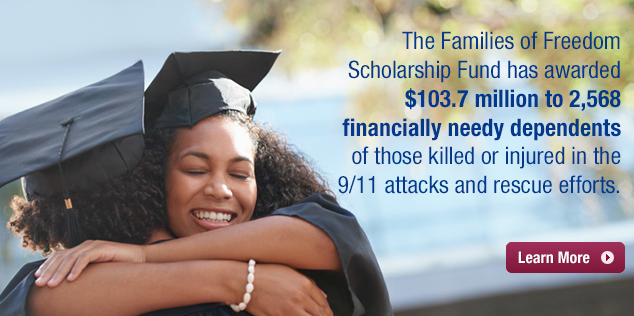
Started right after the attacks, the Families of Freedom Scholarship Fund helps people who are permanently disabled and children of victims who were killed in 9/11. In the 2014-15 school year, the fund distributed $12.5 million in scholarships to 760 students, according to the Associated Press. You can donate on the fund’s website.

The FealGood Foundation advocates for injured emergency personnel, including 9/11 first responders, who need medical benefits. The founder, John Feal, lost part of his foot while supervising recovery and clean-up efforts after the 2001 attacks. You can donate on the FealGood Foundation’s website.

Founded in memory of Michael Lynch, a FDNY firefighter who died responding to the 9/11 attacks, this charity provides scholarships to the children of firefighters, and other victims, killed in 9/11. Since it began, the Michael Lynch Memorial Foundation has provided 158 scholarships worth a total of $4.6 million. You can donate to the scholarship fund on the foundation’s website.
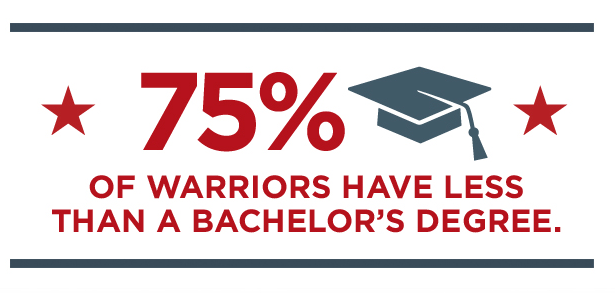
The Wounded Warrior Project helps servicemen and servicewomen who were physically or mentally injured on or after 9/11. The project’s mission is to raise public awareness about injured service members, help the injured assist one another, and provide direct programs to meet the needs of hurt service members. You can donate to the Wounded Warrior Project on its website.
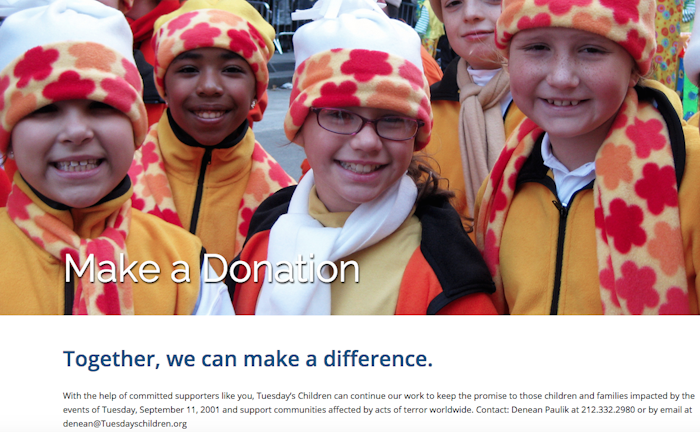
Tuesday’s Children
As a part of its “long term healing model,” Tuesday’s Children helps 9/11 victims, children of 9/11 and their families through career resources, youth mentoring, mental health and wellness, and other support programs, as well as those affected by terrorism worldwide. You can fund its programs by donating to Tuesday’s Children online.
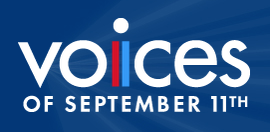
Dedicated to helping meet the long-term needs of families affected by 9/11, VOICES of September 11th works with the World Trade Center Health Program to help victims get the health care they need. The nonprofit also created the VOICES 9/11 Living Memorial Project, an online collection of more than 70,000 photos commemorating the lives lost in the attacks. You can donate on VOICES’ website.
The National September 11 Memorial Museum in New York City pays tribute to the lives lost and those forever affected by the 2001 terrorist attacks. The museum’s website says: “Contribute today to help build a lasting place for remembrance, reflection and learning for years to come.” You can donate to the museum online.
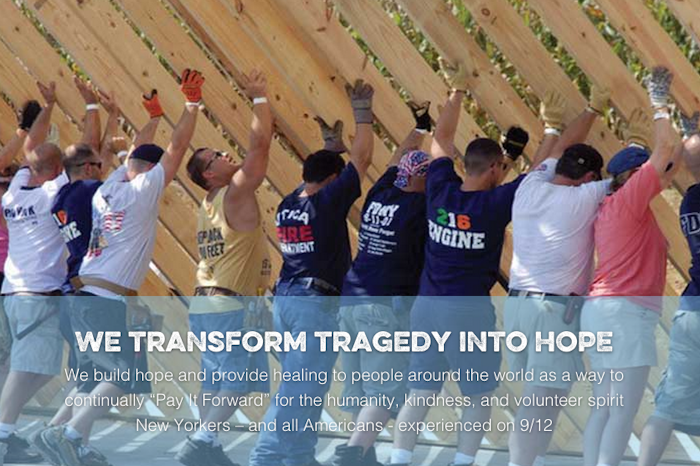
The New York Says Thank You foundation focuses on empowering 9/11 survivors, along with victims of other New York disasters, like Hurricane Sandy. It holds an annual “9/11 barn-raising” where the organization encourages survivors of the attacks to help rebuild and strengthen communities affected by other tragedies. You can donate to New York Says Thank You online.
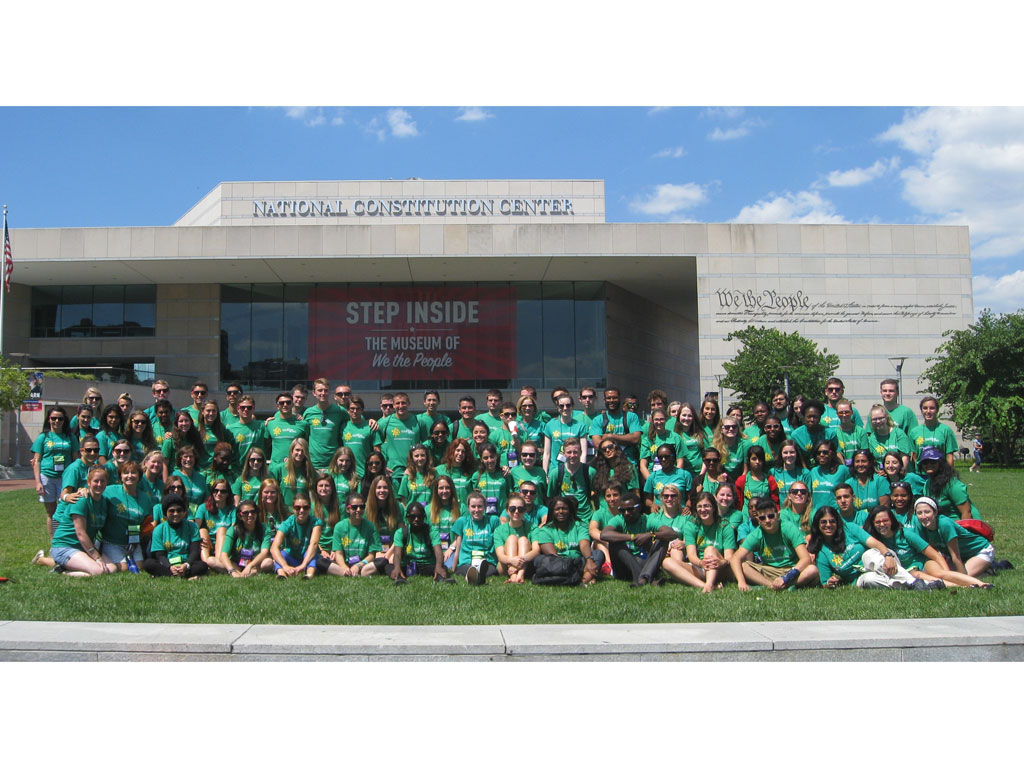
Project COMMON BOND class of 2014
Mijal Tenenbaum was just 3 months old when she lost her father in the 1994 AMIA (Argentine Israeli Mutual Association headquarters) bombing in Argentina.
Growing up, she rarely spoke about losing him. Most of her friends had no idea how he’d even died. “It’s not that I was scared to talk about it, but I definitely avoided bringing it up,” Tenenbaum, now 21, tells PEOPLE. “It was a part of my life that I tried not to let interfere with my day to day.”
But then in July 2010, Tenenbaum met Terry Sears, the executive director ofTuesday’s Children, an organization founded to help families that had lost a loved one in the 9/11 attacks. Tuesday’s Children had recently developed a program called Project COMMON BOND (PCB), which sought to bring together teens victims of terrorism from across the globe.
While speaking at the anniversary of the AMIA bombing in Argentina, Sears asked if there were any teens in the audience who might be interested in joining PCB in Ireland the following week. Tenenbaum volunteered.
“I didn’t really have much time to think about it,” she says.
“She basically followed me back on the plane,” adds Sears with a laugh.
It’s a good thing she did. In Ireland, Tenenbaum met other victims of terrorism for the first time. And in doing so, she learned that she wasn’t alone.
“It was a life-changing experience,” she says. “I realized that it wasn’t just my story, but it was a worldwide issue.
“By acknowledging the effect terrorism had had on my life, I wasn’t letting it define me,” she says. “It had changed me but that didn’t mean that it defined me.”
She adds: “It’s very empowering to be able to take this experience and transform this into a positive thing. To let myself define my path and what it means to me.”
Now, Tenenbaum is one of several young adults who are returning to PCB this week, not as participants, but as group leaders. Together at Bryn Mawr College in Pennsylvania, they’ll serve as role models for the newest PCB participants, helping a new generation of teens overcome personal tragedy.
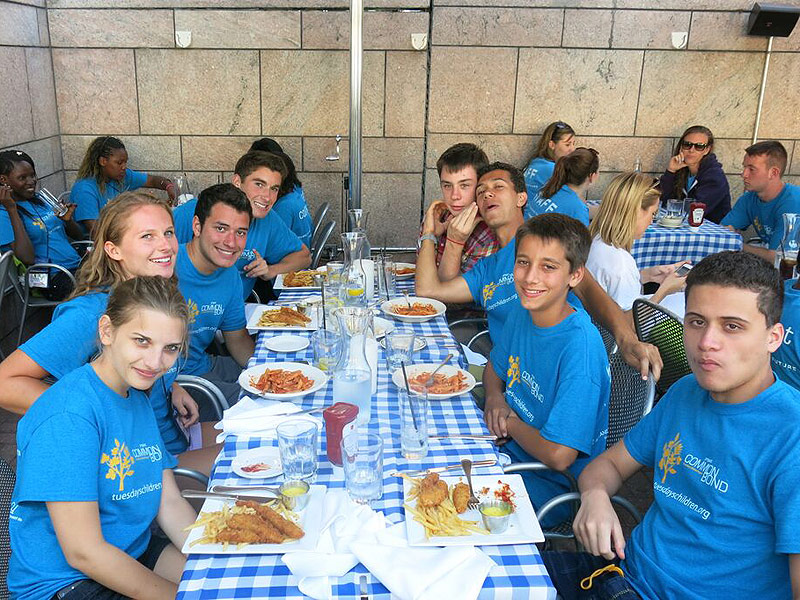
Mijal Tenenbaum (bottom left)
TUESDAY’S CHILDREN
PCB was first held in 2008 with five countries involved. (There are 12 countries attending this year’s symposium.) Inspired by 9/11 children who wanted to create an international community with others who experienced similar loss, the goal of the program is to get teens talking about what they’ve been through – and to help them learn to live with the pain of losing a family member without letting it overcome them.
“Young males particularly didn’t want to talk about what they were feeling,” says Sears.
But what’s special about PCB is that no one’s forced to open up if they don’t want to. “They don’t have to have these conversations,” says Sears. “Sometimes it’s just about listening.”
For the most part, she says, the teens aren’t shy at all. “They come together and there is this unspoken bond immediately,” she says, adding that she’s seen many lifelong friendships – and even some romances – come out of PCB.
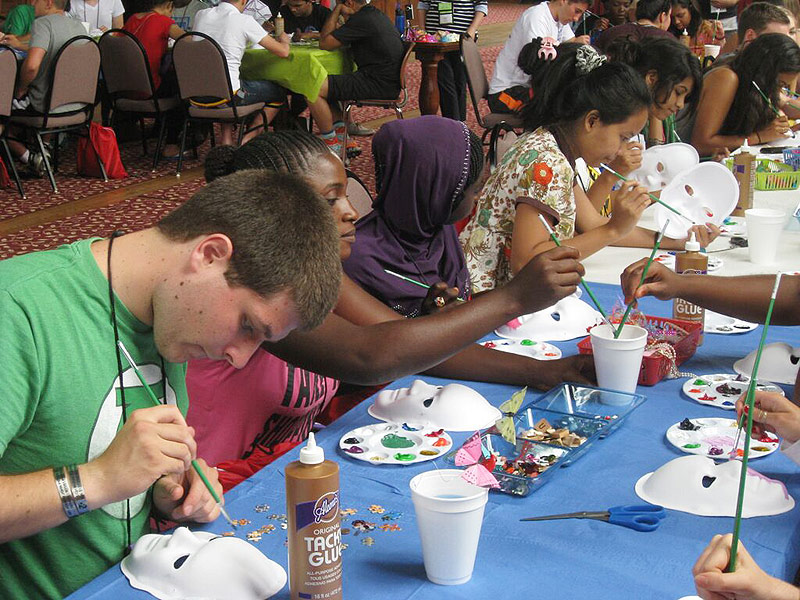
Robbie Pycior (bottom left)
TUESDAY’S CHILDREN
The chance to meet new people from different backgrounds is Robbie Pycior’s favorite part of PCB. “Last year, I played the piano with someone from Kenya who’d never seen a piano before,” he says. “After five days, he loved the piano.”
He adds: “They’re friendships that last a lifetime that you’d be hard-pressed to find elsewhere.”
Like Tenenbaum, 22-year-old Pycior is returning to PCB this year as a group leader. Since he first attended PCB in Ireland in 2010, he says he’s grown tremendously as a person.
“My father was killed in the Pentagon on September 11, 2001,” Pycior explains. “I wasn’t angry at a certain group, but I was just very angry in general. It’s been a relief to see that other people have experienced that anger as well.”
Now, he’s learned to channel that anger away from groups of people and towards individuals.
“There are bad people that are Jewish, Muslim, Christian, white, black, doesn’t matter,” he says. “But there are also good people. Being able to realize that is important.”
He adds: “Playing Frisbee with an Israeli and a Palestinian is just amazing. Seeing that they can be in the same place together, that they’re both willing to come to PCB, it made me realize that there are bad people, but there are good people too. ”
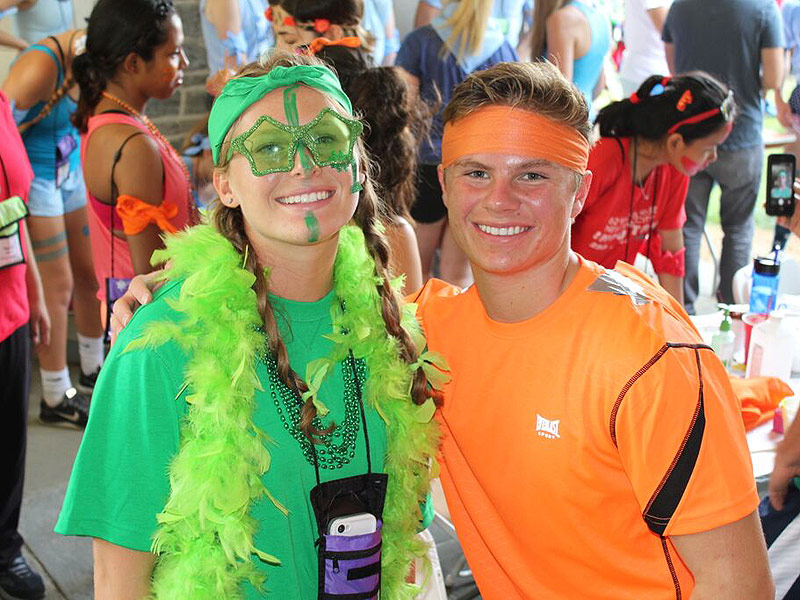
Jess Wisniewski (left)
TUESDAY’S CHILDREN
It’s Jess Wisniewski’s sixth year returning to PCB. She’s witnessed countless teens come out of their shells, and as a group leader this week, she’s eager to take on the role of a mentor.
“It’s really, really rewarding,” says the 20-year-old, who lost her dad on 9/11, just a month before her seventh birthday. “In real life, it’s so difficult to talk about. But at PCB, you want to talk about it instead of being pressured into talking about it. You don’t have that awkward moment.”
And if her kids learn one thing this week, she hopes it’s that they know they have everyone’s support. “It really is a family,” she says of PCB, “a group of people you can reach out to at any point.”
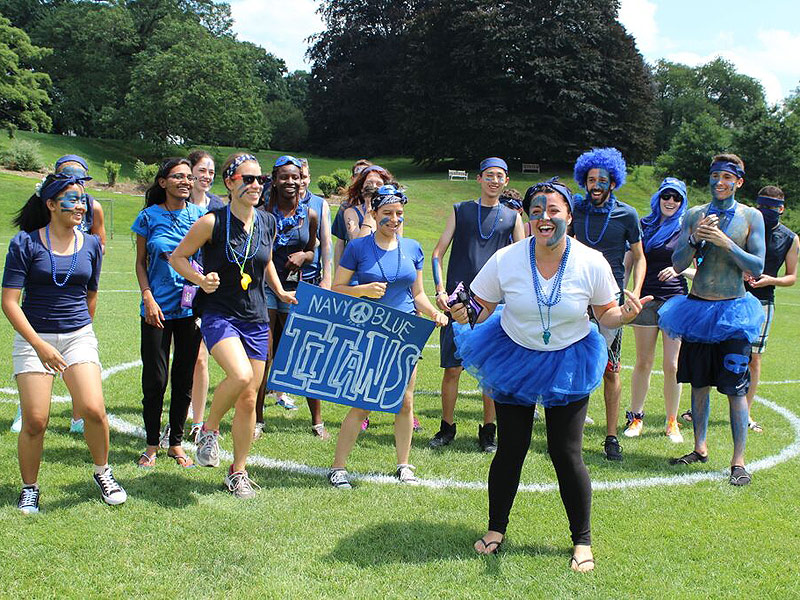
Francesa Picerno (in the tutu)
TUESDAY’S CHILDREN
Francesca Picerno, another veteran camper who’s returning as a group leader this week, looks forward to helping teens open up. “I’ve seen all the international kids who participate and they come closed off, but they open up by the end of the week,” she says. “I want to be a part of that.”
Picerno, 22, also lost her father on 9/11. She says she was nervous to come to PCB for the first time, but now credits it with “shaping the person” that she’s become.
“When I first went, I was very angry,” she says. “I had no closure and I didn’t think I’d ever get any. I was a very troubled teenager. Seeing how somebody else felt the same way that I did surprised me.”
Picerno can’t wait to see teens have the same experience she did. “It’s really cool to see how you can connect with someone who doesn’t even speak the same language,” she says.
She continues: “I didn’t really think I wanted to talk about it. I was really, really wrong.”
Project COMMON BOND runs from July 26 to Aug. 3 at Bryn Mawr College in Pennsylvania. You can donate to Tuesday’s Children here.
We are delighted to announce that Project COMMON BOND 2015 has been featured on Fox News. Watch the coverage below:
Copyright ©2024 Tuesdays Children. 390 Plandome Road, Suite 215, Manhasset, NY 11030 • (212) 332-2980 • (516) 562-9000 • EIN # 52-2347446
Privacy Policy and Meaningful Access Statement • Board of Directors • Financials
If you have questions or would like more information, please email keri@tuesdayschildren.org
"*" indicates required fields
Get monthly updates from Tuesday's Children